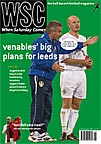 From top to bottom, in Britain and abroad, fooball's finances are in a mess. Dave Jennings examines the plight of one club, Bradford City
From top to bottom, in Britain and abroad, fooball's finances are in a mess. Dave Jennings examines the plight of one club, Bradford City
I was sitting in my usual seat at Valley Parade, but something was badly wrong. There were only about 200 people there, and we were watching a truly dire game. A handful of away fans were chanting “Hello, hello, League rejects”. Fortunately, I then woke up and realised that it had all been a particularly vivid nightmare. Bradford City weren’t a non-League club… yet.
But for much of the close season, that has seemed like a distinct possibility. After the administrators running the club tried to tear up the contracts of most of City’s playing staff, the Football League, understandably, threatened City with expulsion.
Meanwhile, the fans could only look on in helpless horror at what was being done to their club. City’s squad was reduced to a five-a-side team. Nine members of the club’s non-playing staff were also dismissed, and the sudden closure of City’s Upfront Superstore sports shops in Wakefield and Dewsbury put 32 more people out of work.
No viable bids from potential new owners were received when Bradford City was offered for sale. At the time of writing, a Company Voluntary Agreement is under discussion which, if passed, will reinstate the club’s pre-administration board of directors. That has caused considerable unease among City fans. After all, we ended up in this mess largely because of mistakes made by the chairman Geoffrey Richmond – a fact Richmond himself has freely admitted.
At a public meeting in May he confessed: “I will never, ever forgive myself for spending the money we did in the second year in the Premiership. Looking back now, it was six weeks of madness.” During those six weeks, around the start of the 2000-01 season, City signed Benito Carbone, Ashley Ward, Dan Petrescu and David Hopkin, none of whom were able to keep the club off the bottom of the Premiership. For a time last season, it looked as though City might make it two relegations in a row.
Yet Richmond remains remarkably popular with many Bradford City supporters. When he took over at Valley Parade in January 1994, City were a mid-table Second Division outfit. Since then we have enjoyed two promotions and two seasons in the Premiership. We have even played in Europe, thanks to the Intertoto Cup, and Valley Parade has been improved almost beyond recognition.
The case against Richmond and the board of directors is largely built on the generous share dividend payments they have awarded themselves. Ninety-eight per cent of Bradford City shares are owned by Richmond’s family and that of the other main investor in the club, Professor David Rhodes. The City board sanctioned dividend payments of more than £2 million in 1999 and more than £6 million in 2000, almost all of which went to the board members themselves. Richmond also took a £250,000 “consultancy fee” in October 2001.
In their defence, the board point out that they have invested huge amounts of their own money in the club, and that Richmond has never drawn a salary for his full-time job as chairman. They can also reasonably claim that everything went wrong at once, when ITV Digital collapsed and Carbone’s anticipated transfer to Middlesbrough fell through.
But there are other complaints against Richmond. He alienated many City fans with his outspoken support for the idea of Celtic and Rangers joining the bigger First Division clubs in the proposed “Phoenix League”. The club fanzine, the City Gent, has remained impartial on the subject of Richmond, so much so that one of last season’s issues featured two alternative covers, one pro-Richmond and one anti-Richmond. The Gent is itself among City’s creditors, and the editorial team plan to vote for the CVA deal to restore the Richmond regime.
However, CG has also published some strong criticism of the chairman. The editor Richard Halfpenny explains: “It happens that concerns about the finances at Bradford City, even before administration, around such issues as millions of pounds worth of dividend payments, have been at the forefront of many contributors’ minds.”
David Pendleton is one such contributor. He remarks: “The fans are bitterly divided on the return of Geoffrey Richmond. No one doubts his achievements at Valley Parade, but the very fact he drove the club to within an ace of the Northern Counties East League has left fans bewildered. He always prided himself on financial acumen, and that reputation is in ruins.”
As Richmond has acknowledged, Bradford City owes its continued existence to the Professional Footballers’ Association. The PFA has loaned the club a reported £4 million in order to make it possible for the players to be paid. Carbone has clearly gone for good, but most of the rest of last season’s squad are now back in training.
It looks as though some sort of future for Bradford City has been secured, but part of the price of the PFA’s support is a transfer embargo that means players have to leave before any new recruits can be signed. City got into trouble largely through reaching the Premiership and trying to stay there. At least that particular problem seems unlikely to face us again in the near future.
From WSC 187 September 2002. What was happening this month